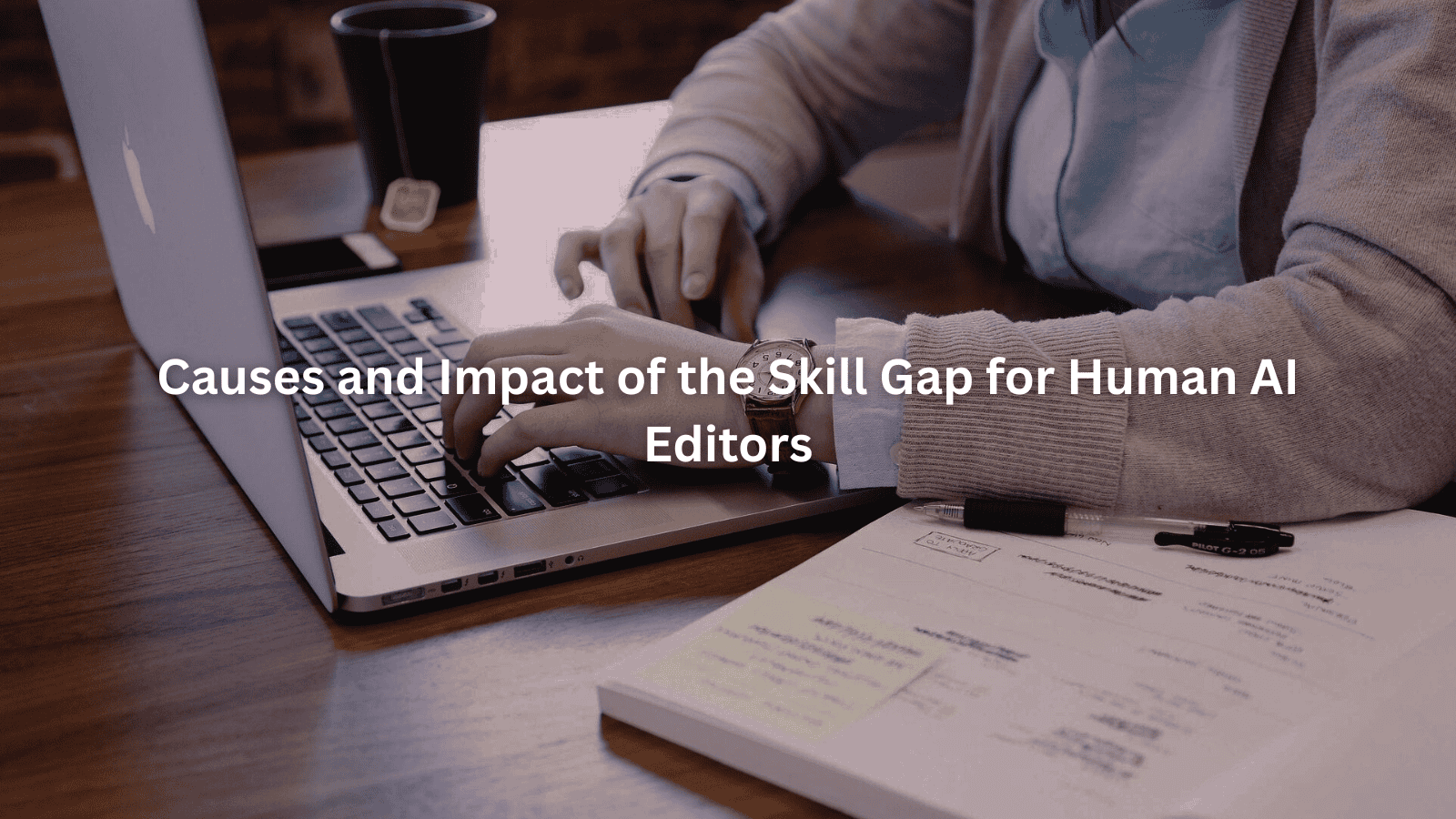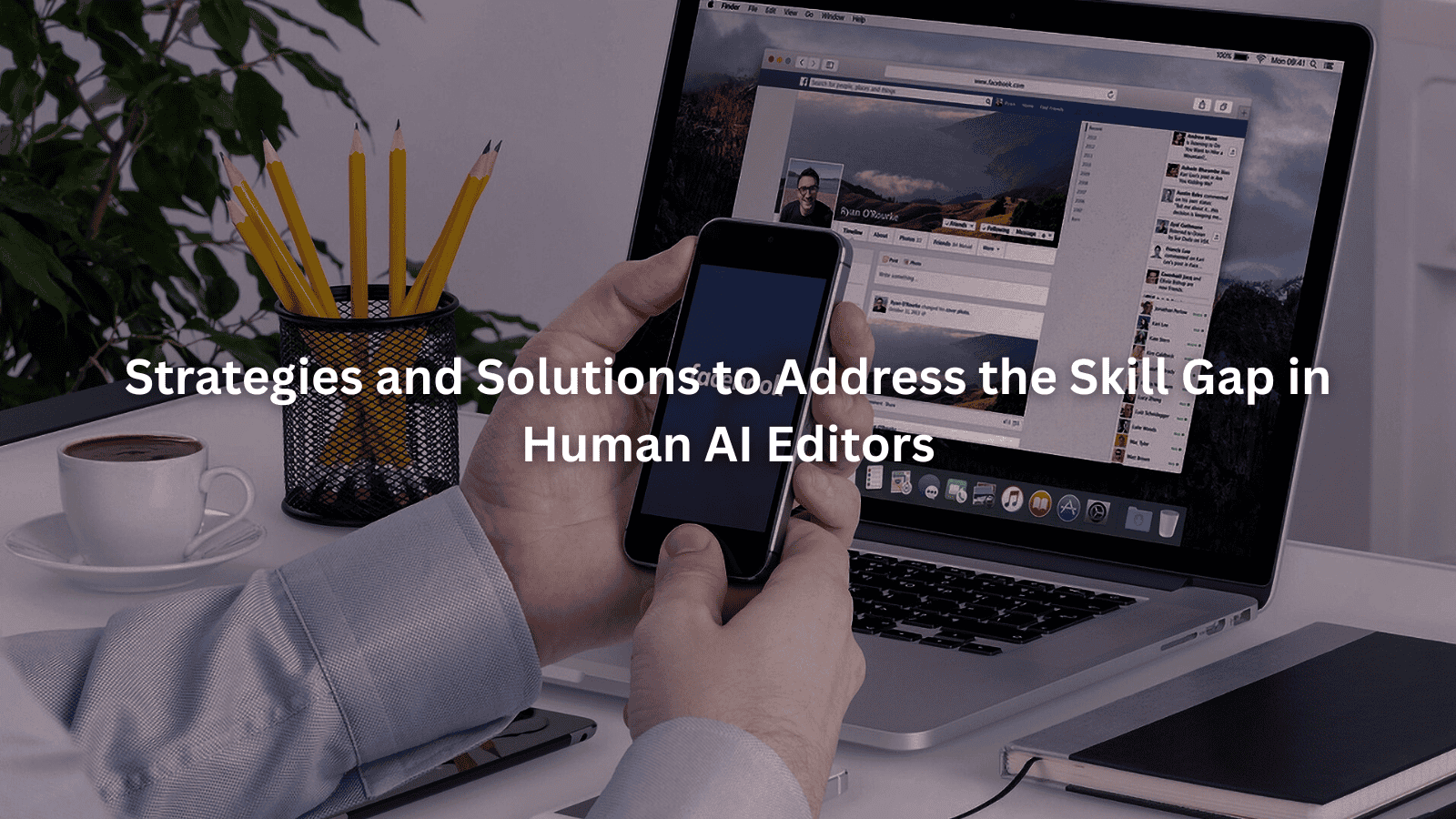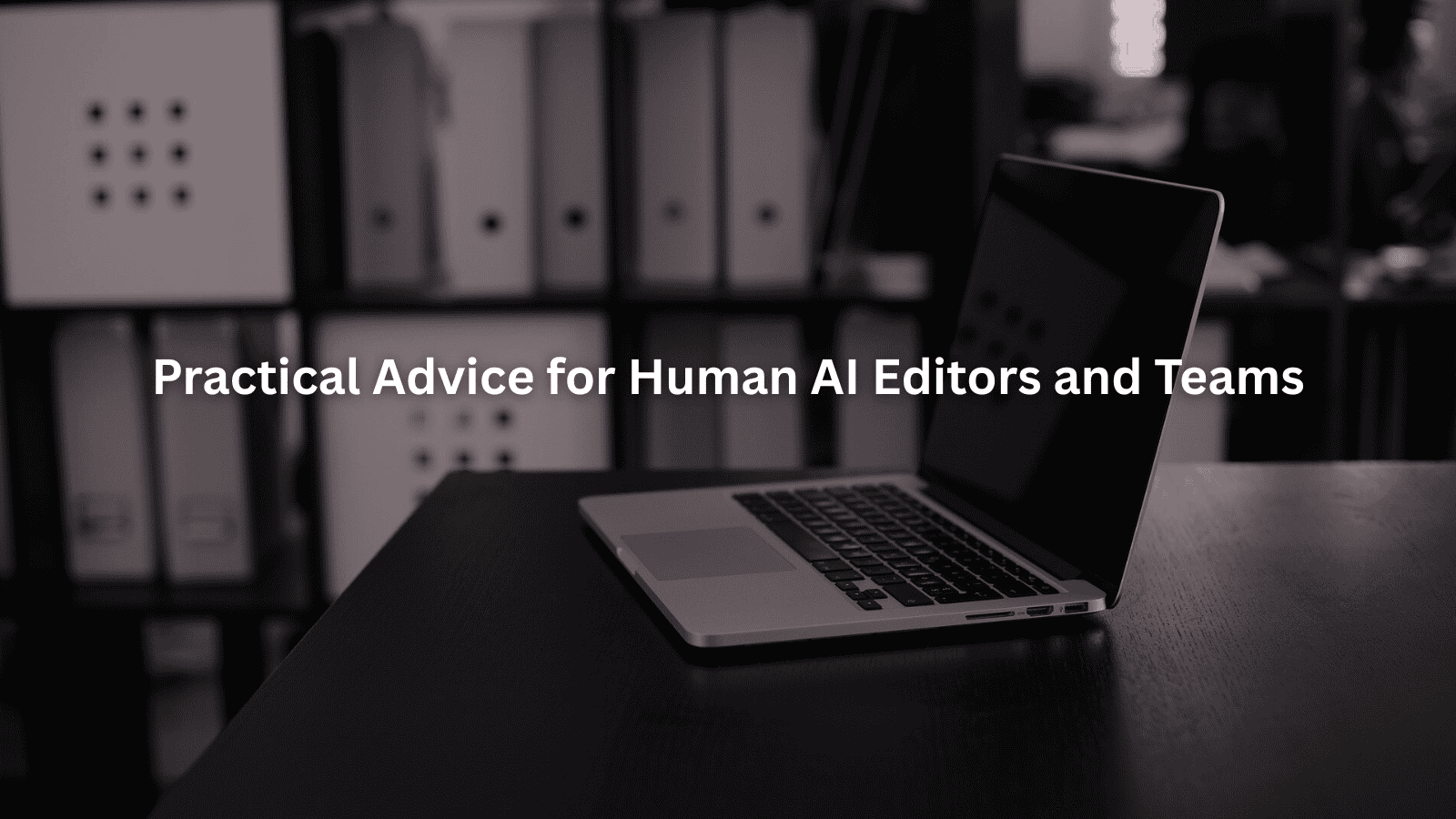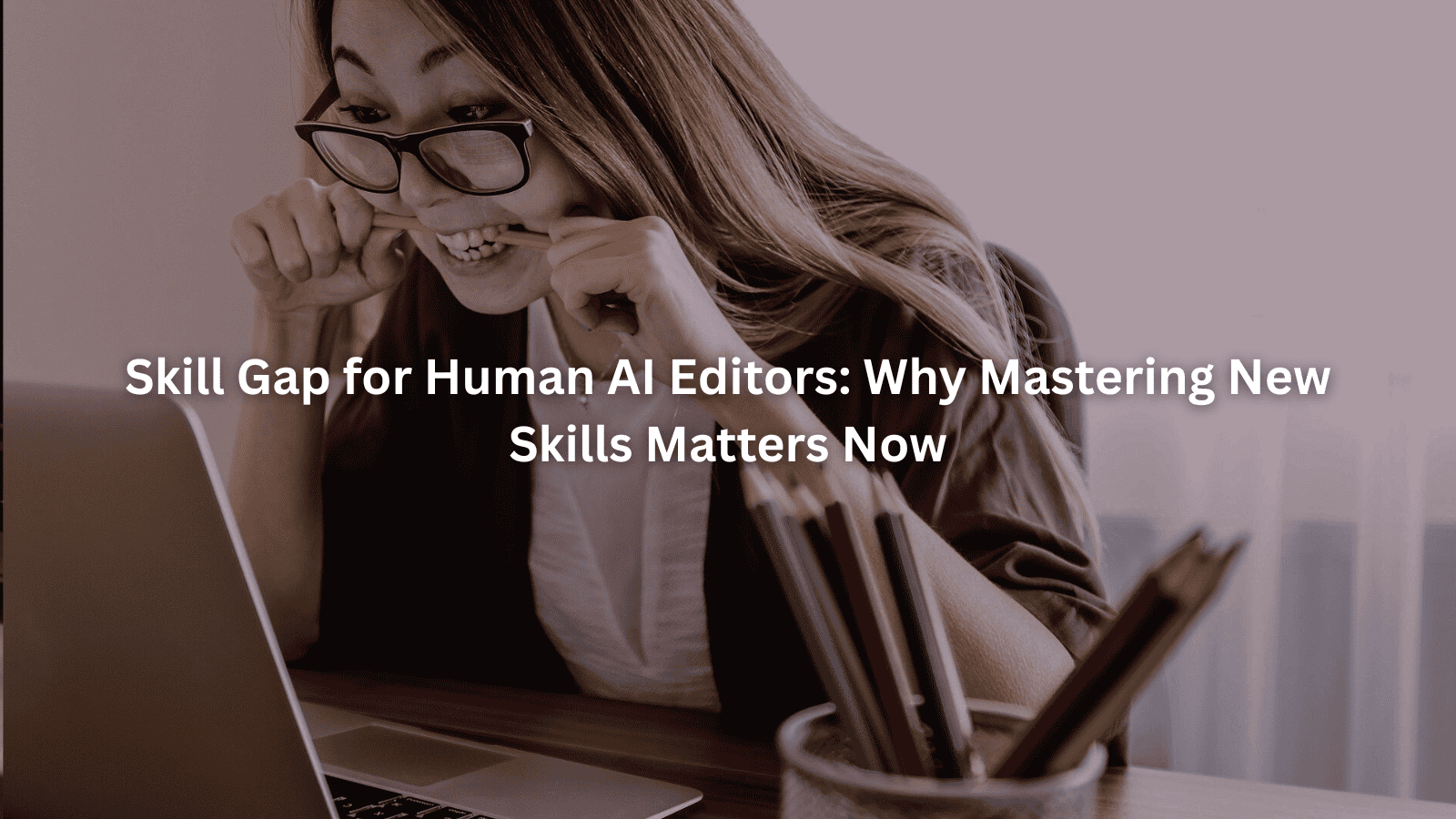Being an AI editor isn’t just clicking buttons anymore. Nope. These folks need to juggle everything from writing clever prompts to catching fake facts and biases. Plus they gotta know SEO tricks and writing styles.
The problem is, AI moves so fast that nobody can keep up with proper training. We see it at Jet Digital Pro all the time. But when you get to that sweet spot, where smart humans and smart machines work together? Magic happens. Real content that people actually trust. And that’s what matters.
Key Takeaways
- Look, you can’t just know computers or just know writing anymore. Good editors need both. Brain and machine working together.
- Things move crazy fast in AI land. Nobody’s had time to figure out proper training. Everyone’s playing catch up.
- Gotta keep learning, keep talking to other people who know their stuff. That’s the only way forward. No shortcuts.
Skill Gap for Human AI Editors: Required Skills and Current Challenges
Things move crazy fast in AI land. Just ask anyone at Jet Digital Pro. We jumped into this whole AI thing thinking it’d be simple. Boy, were we wrong. You really gotta learn to speak robot, tell these things exactly what’s what. Otherwise? Pure nonsense comes out.
These days, being an AI editor means you’re basically a circus juggler, balancing challenges human editors face when working with AI content like machine sweet talk, fact-checking, brand voice, and SEO without dropping the ball.
Machine Sweet Talk: Getting computers to do what you actually want BS Detective Work: Finding those little lies and weird assumptions that creep in Brand Personality: Making sure everything feels like it came from the same brain Google Pleasing: Keywords and stuff without sounding like a robot wrote it
Real talk? Editors can’t just fix spelling anymore. They gotta dig in deep, make things mean something. Nail those computer instructions early? Saves your sanity later.
And let me tell you about fact checking. These AI programs will look you dead in the eye and tell you complete fiction. Zero shame. We remember one time we caught an AI-generated travel guide claiming a lake existed in the middle of downtown Miami, pure fiction that almost went live. Plus they’ve got their own little biases buried in there. Gotta watch for that.
Making everything sound right for the brand is another whole thing. Working with agencies means knowing exactly how formal or casual to get. Then there’s all the SEO stuff. Try making “affordable luxury leather goods in Miami” sound natural in a sentence. Not as easy as it looks.
But here’s the real problem: most editors are trying to learn this stuff on the fly. Nobody taught this in journalism school. And who’s got time to learn when deadlines keep piling up? Plus nobody can agree on what’s right or wrong with AI anyway. Rough stuff.
Causes and Impact of the Skill Gap for Human AI Editors

The root causes of this skill gap are straightforward when you consider the pace of AI technology. AI tools evolve so fast that training programs struggle to keep up. When we launched our internal editor training at Jet Digital Pro, we had to constantly update materials to reflect new AI capabilities and pitfalls. IMD notes that, particularly with generative AI, the focus has shifted from hiring new technical specialists to upskilling and reskilling your current workforce, embedding AI literacy and prompting skills across roles. [ 1 ]
Some companies get it, throwing money at proper training. Others? Just toss their editors into the deep end and say “swim.” Everyone’s running around with different skill levels. Pretty messy. Plus everyone’s so caught up in the tech stuff, they forget about the human touch. Big mistake.
You should see what happens when things go wrong. We’ve caught some real doozies, articles full of made up facts that almost went live because nobody double checked. Once readers spot that kind of thing? Good luck getting their trust back.
And don’t even get me started on brand voice. Nothing worse than content that sounds like five different people wrote it. Our editors waste hours fixing basic mistakes instead of making things actually better. No wonder they’re burning out. Who wouldn’t?
Causes Driving the Skill Gap in Human AI Editing Roles
The skill gap isn’t random. It stems from industry trends and fast AI growth. AI tech moves quickly, but training hasn’t kept pace. Many companies adopt AI tools unevenly, creating skill differences across teams.
- Rapid AI advances outstrip current training efforts.
- Few widely available coaching or certification programs exist.
- Some organizations focus more on AI deployment than human skill-building.
- Soft skills like ethical judgment and creativity often get overlooked.
At Jet Digital Pro, we address this by blending AI with human expertise and prioritizing ongoing editor training to keep skills sharp.
Strategies and Solutions to Address the Skill Gap in Human AI Editors

Look, you can’t just take one class and call it good. No way. At Jet Digital Pro, we keep pushing our people to learn more, dig deeper. We run these sessions about how AI actually thinks, why it spits out what it does. Weird stuff sometimes. But that’s the point. Our editors need to get inside these machines’ heads a little bit, figure out what makes them tick.
Ethical AI use and bias mitigation training are baked into our process, and our editors are skilled at fixing subtle biases in AI-generated drafts so the final copy feels fair, accurate, and trustworthy.
The skill gap isn’t random. It stems from industry trends and fast AI growth. AI tech moves quickly, but training hasn’t kept pace. Many companies adopt AI tools unevenly, creating skill differences across teams.
Rapid AI advances outstrip current training efforts:
- Few widely available coaching or certification programs exist.
- Some organizations focus more on AI deployment than human skill-building.
- Soft skills like ethical judgment and creativity often get overlooked.
At Jet Digital Pro, we address this by blending AI with human expertise and prioritizing ongoing editor training to keep skills sharp. Flexible learning platforms make it easier for busy editors to stay updated at their own pace. We provide resources that cover both technical and soft skills, encouraging editors to develop critical thinking and empathy alongside AI proficiency.
Collaboration helps too. Bringing human editors and AI specialists together sparks better workflows. We promote team-based content review, combining AI’s speed with human judgment to enhance nuance. Tools for AI content auditing support quality control, while clear ethical guidelines provide a framework editors can trust.
Changing Editorial Responsibilities in the AI Era editors’ roles are shifting. We see less time spent on basic writing and more on:
- Fact verification and adding context.
- Aligning content with strategy and SEO goals.
- Combining AI understanding with human creativity and judgment.
- Elevating originality and authenticity in AI drafts.
These new demands require updated skills and mindsets. Our editors at Jet Digital Pro embrace these changes, becoming vital content partners.
Preparing for Future Skill Requirements and Industry Demands
Looking forward, editors will need to:
- Master advanced AI tools and content calibration.
- Develop emotional and cognitive skills to humanize content.
- Bridge gaps in both technical expertise and soft skills.
- Use adaptive editing and iterative feedback to refine AI outputs.
At Jet Digital Pro, we prepare our team for these future demands so we can deliver scalable, quality content solutions.
Enhancing Content Depth, Richness, and Readability
Editors add what AI can’t, layered insights, nuanced details, and smooth language flow. Our work includes:
- Enriching content with context and background.
- Making language natural and easy to read.
- Structuring ideas clearly for better understanding.
This human touch turns AI drafts into engaging, valuable content. Combining speed with editorial depth is how we deliver success.
Evolving Role and Future Outlook of Human AI Editors: Skill Adaptation and Industry Trends
The role of human AI editors is shifting. They’re moving away from simple content creation toward strategic refinement. At Jet Digital Pro, we see editors focusing more on fact verification, contextual analysis, and creative enhancement of AI drafts. It’s a more nuanced role requiring both algorithmic literacy and human insight.
This shift demands editors balance technical skills with creativity and emotional intelligence. Authenticity and originality become paramount as audiences grow savvy to AI-generated content. Human editors are the ones who breathe life into otherwise mechanical text.
As one CustomerThink feature puts it, “AI agents … handle the repetitive, time-consuming grunt work … This allows human agents to do what only they can: demonstrate empathy, solve complex problems, and build genuine relationships.” And that is exactly what human AI editors should be doing, taking the mechanical draft and turning it into something human, trustworthy, resonant. [ 2 ]
Looking ahead, advanced AI tools will require even deeper proficiency. Editors will need to calibrate AI outputs carefully, adapting tone, style, and context dynamically. At the same time, emotional and cognitive skills like empathy will help human editors humanize content, making it relatable and trustworthy.
There’s also a growing need to address supply-demand gaps in training. Organizations must prioritize lifelong learning and iterative feedback to keep pace with AI advances. The future belongs to teams who blend technical expertise with human judgment seamlessly.
Practical Advice for Human AI Editors and Teams

If you’re working as a human AI editor or managing such a team, start by assessing current skill levels honestly. Identify gaps in AI knowledge as well as soft skills like decision-making and ethical awareness.
Seek out or create targeted training programs that cover AI prompt engineering and fact-checking thoroughly. Don’t neglect bias detection and style adaptation, they’re equally essential.
And let me tell you about fact checking. These AI programs will look you dead in the eye and tell you complete fiction zero shame so dealing with AI’s habit of making things up has become second nature for our team.
Encourage continuous learning through workshops, coaching, and flexible online resources. Foster collaboration between editors and AI technologists to share insights and improve workflows.
Look, first thing’s first: everyone needs to know what’s okay and what’s not when they’re cleaning up robot writing. Ground rules matter.
Here at Jet Digital Pro, we figured out something pretty cool. Let the machines do what they’re good at, then let our editors work their magic. Gets our clients what they need, when they need it. Simple as that. Doesn’t matter if you’re running an agency or working in house, you gotta stay ahead of this stuff or you’ll get left behind.
Want to see how we make computers and humans play nice together? Give us a shout. We know a thing or two about keeping content real while cranking up the volume. No robot speak, promise.
FAQ
What specific AI-related skills should human editors focus on to close the skill gap?
Editors need to master AI prompt engineering to guide content generation accurately. They must develop fact-checking abilities to verify AI outputs and bias detection skills to catch subtle prejudices. Style adaptation ensures consistent brand voice, while SEO optimization aligns content with search trends. Together, these skills help editors polish AI drafts into reliable, engaging content.
Why do many human editors struggle with AI literacy?
AI literacy means understanding how AI models create text, their limitations, and typical errors. Many editors come from traditional backgrounds without formal AI training. This knowledge gap makes it tough to spot AI mistakes or craft effective prompts, slowing editing and risking lower content quality.
How do unclear ethical standards affect human AI editors?
Ethical guidelines around AI content are still developing. Editors often face uncertainty about handling bias, misinformation, or sensitive subjects in AI-generated text. This confusion leads to inconsistent ethical decisions, potentially harming brand credibility or offending readers.
In what ways does ongoing learning help human editors keep up with AI?
Continuous learning equips editors with the latest AI tool knowledge and editing techniques. Frequent training, coaching, and feedback improve skills and confidence. At Jet Digital Pro, we’ve seen editors grow stronger and produce better content when supported by ongoing education.
How does collaboration reduce the skill gap in AI content editing?
Collaboration unites technical AI experts, editors, and strategists. This teamwork helps editors gain new insights, share best practices, and catch errors early. At Jet Digital Pro, cross-disciplinary cooperation improves both editor skills and the quality of final content.
Conclusion
Bridging the skill gap for human AI editors is essential. As AI evolves, so must our skills in prompt engineering, fact-checking, and ethical judgment. At Jet Digital Pro, we’ve seen how continuous learning turns challenges into opportunities. By blending human insight with AI efficiency, we deliver content that’s accurate, nuanced, and trustworthy, every time.
Ready to scale with smart, human-driven editing? Contact Jet Digital Pro today.
References
- https://www.imd.org/blog/digital-transformation/ai-in-hr
- https://customerthink.com/sorry-ai-cant-fix-your-cx-but-talented-humans-can

